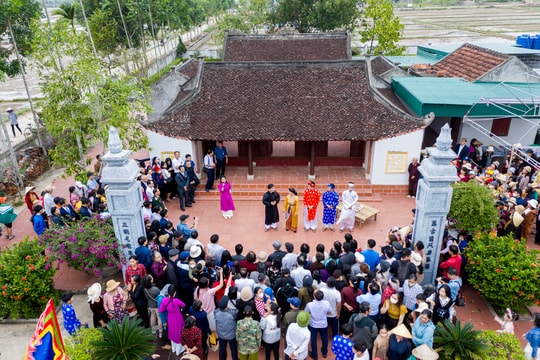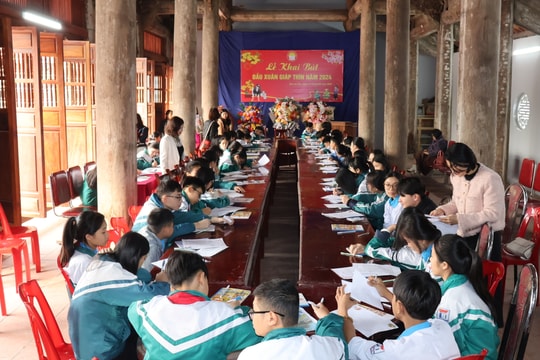The village of talented people - homeland of the Nom poet Ho Xuan Huong
(Baonghean.vn) - As a native of Nghe An, I have heard of Quynh village's reputation since I was very young, but I first had the desire to set foot in Quynh village when I learned the poems of poetess Ho Xuan Huong - a talented, erudite, yet "folk" and arrogant voice.
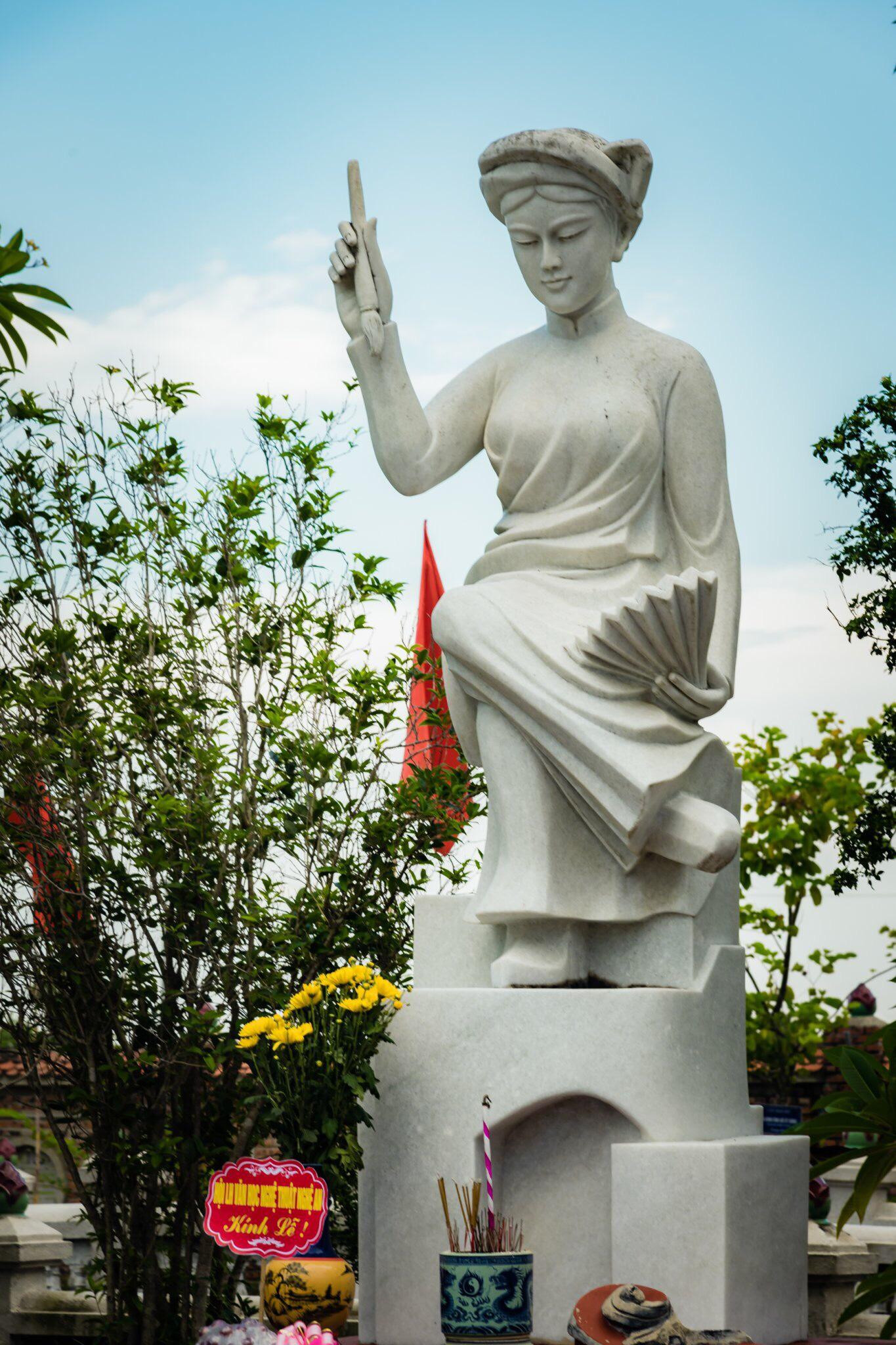 |
Statue of poetess Ho Xuan Huong in Quynh village. Photo: Nhat Thanh |
What is so special about that land that it gave birth to so many famous people, especially the extremely unique woman Ho Xuan Huong? That question always lingered in my mind along with the lectures of Associate Professor, Dr. Truong Xuan Tieu, the teacher who taught the subject of Ho Xuan Huong's poetry in the Medieval Vietnamese Literature course when I was in university: In Vietnamese literature, there are two authors who are loved by Western readers: Ho Xuan Huong and Vu Trong Phung.
He explained that the reason why Ho Xuan Huong's poetry is loved by foreign readers is because of its polysemy. It is difficult for Vietnamese people to understand Ho Xuan Huong's poetry in Vietnamese, and it is even more difficult for foreigners to understand it. On the other hand, translating Ho Xuan Huong's poetry is also a challenge for translators. Translators must understand Vietnamese and Vietnamese culture to be able to convey some of the soul of Ba Chua Tho Nom poetry. Perhaps that is why her poetry is always mysterious to foreign readers. In the medieval literary world of Vietnam, poetess Ho Xuan Huong is a strange phenomenon and still has many mysteries. But one thing is certain: she is a rare literary phenomenon with her talent and courage.
Village of scholars
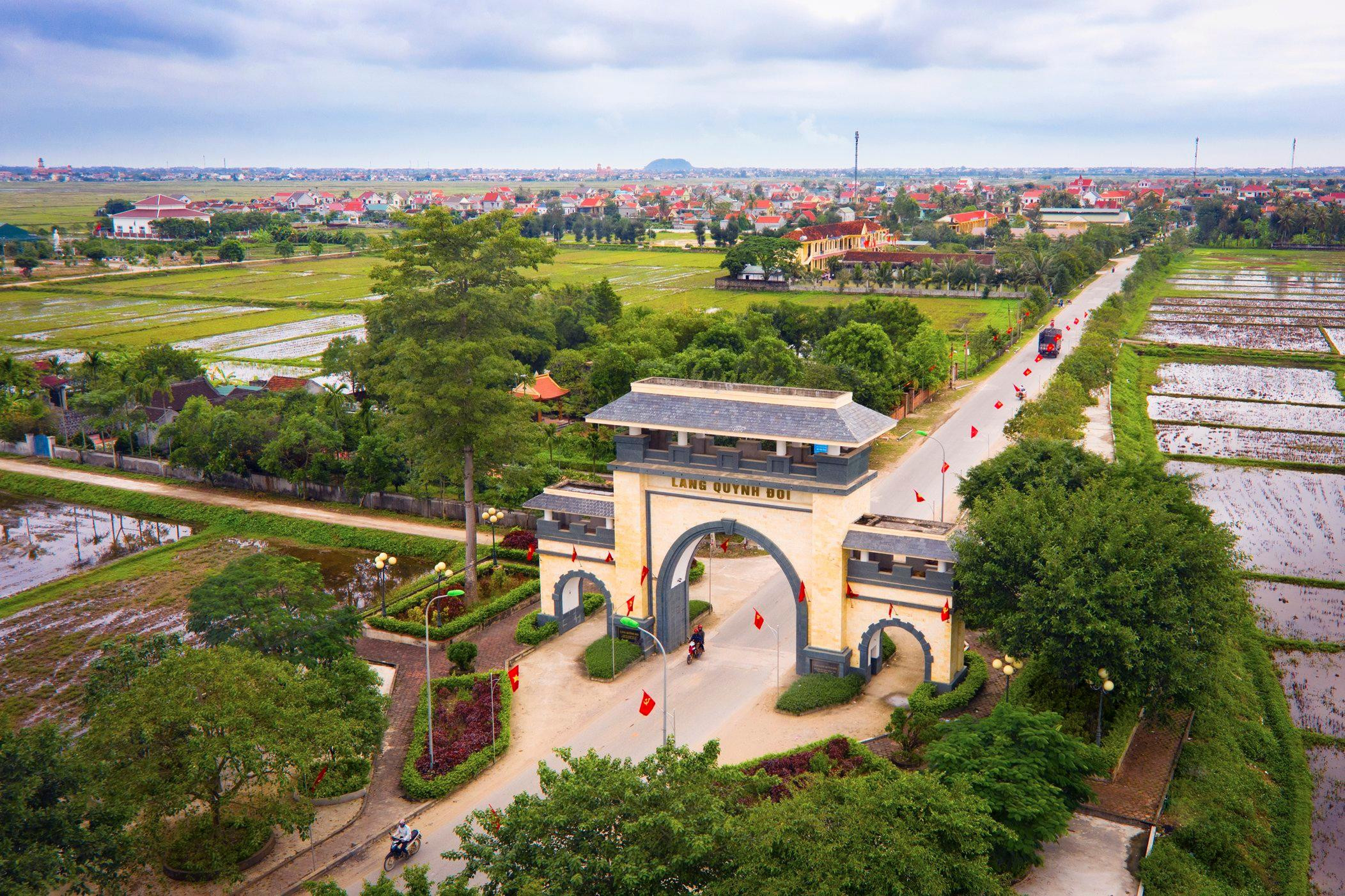 |
View of Quynh village. Photo: Nhat Thanh |
That is why, in 2015, I was extremely excited to visit Quynh Doi village with the delegation of the Vietnam Writers Association in Nghe An. And my first impression of the village was… the village gate. The Quynh village gate is majestic and imposing, both traditional and modern. It is known that the cost of building the village gate was contributed by Quynh Doi children from all over the country.
A series of relics appear one after another as soon as you pass through the gate of Quynh village. Right on the left of the village gate is the National Historical and Cultural Relic - the tomb and temple of Quynh Quan Cong Ho Phi Tich. Ho Phi Tich (1665 -1754), passed the Hoang Giap exam in the year of Canh Thin (1700), became an official to the Minister of War, Ministry of Justice, and was given the title of Quynh Quan Cong. Ho Phi Tich is a typical historical figure who has made many contributions to the cause of building and defending the Fatherland. He was an honest, virtuous, talented, and good mandarin who devoted himself to the people and the country, especially to his hometown of Quynh Doi.
Next to the Ho Phi Tich family temple is the memorial stele of poetess Ho Xuan Huong - the Queen of Nom poetry. Next is the tomb of the revolutionary predecessor Ho Tung Mau, the monument of the armed forces hero Cu Chinh Lan. They were the children of Quynh village who made many contributions to the cause of building and defending the Fatherland. The Ho family temple was built on a fairly large campus, next to the lush green rice fields. Here are steles honoring historical and cultural celebrities who are descendants of the Ho family such as: King Ho Quy Ly; Emperor Quang Trung (Ho Thom); Third-class Doctor Ho Si Duong, who served as an official in four Le dynasties; Second-class Doctor Ho Phi Tich, who served as a mandarin in the Ministry of War; Prime Minister Ho Si Dong; Deputy-rank Doctor Ho Ba On... In the Ho family temple grounds, there is also a statue of Ho Xuan Huong and two steles engraved with two unique Nom poems "Banh troi nuoc" and "De den Sam Nghi Dong" by the poetess. These are just a few of dozens of relics in Quynh Doi, with 8 national historical and cultural relics, but that is enough to speak of the stature of a village of talented people!
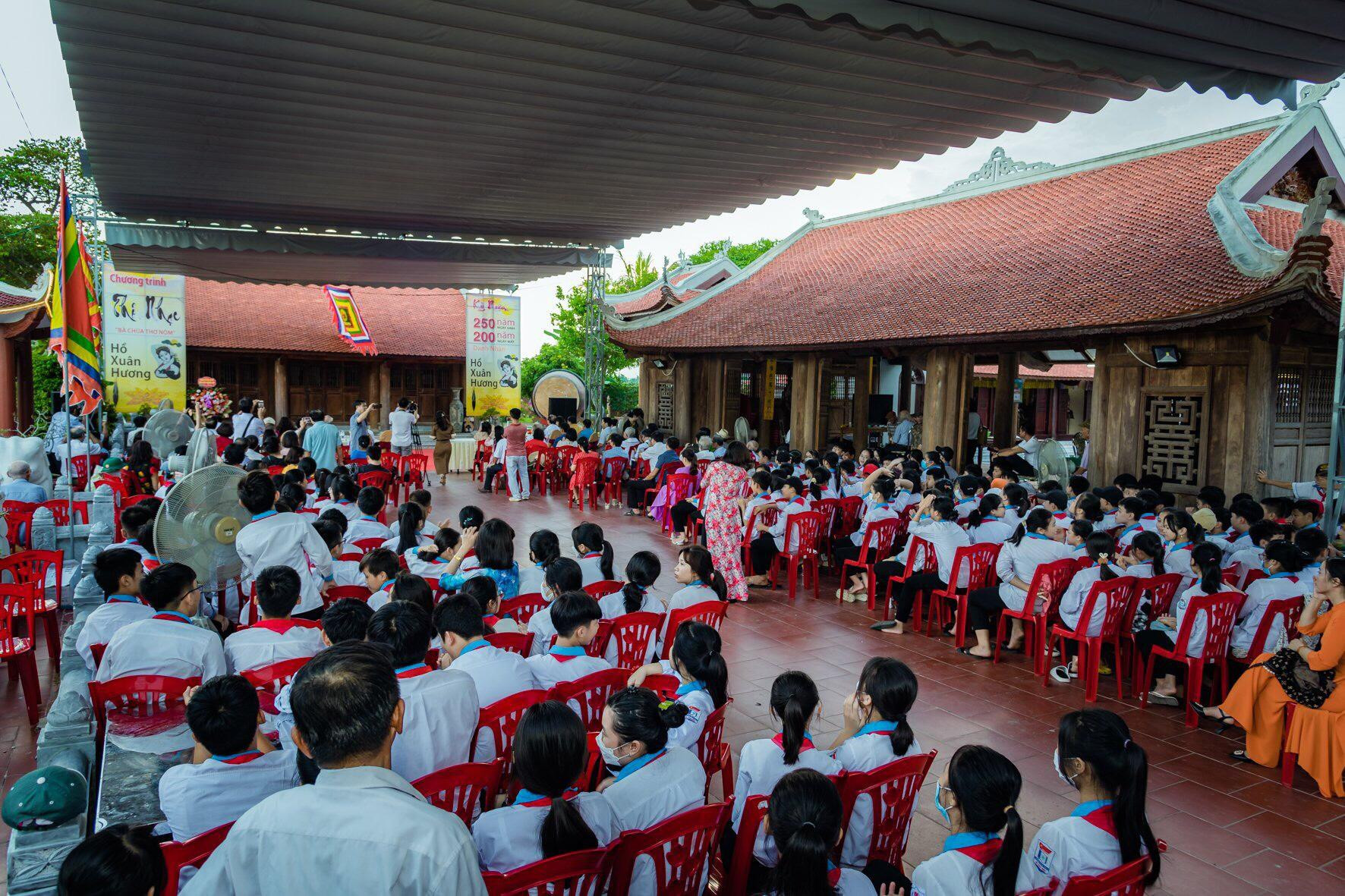 |
Organizing a poetry and music exchange with the Goddess of Nom poetry Ho Xuan Huong in Quynh village. Photo: Nhat Thanh |
The cultural officer of the commune that day led us inside to offer incense to the ancestors, and introduced to the artists the main features of the tradition of the village's mandarinate. According to the village history, Quynh Doi village was formed in the second year of Xuong Phu (1378). At that time, Mr. Ho Kha assigned his eldest son, Ho Hong, along with Mr. Nguyen Thac and Mr. Hoang Khanh, to come here to open the foundation and establish the village. At first, the village was called "Tho Doi Trang", until 1528, Mr. Ho Nhan Hy (Mac Dynasty) changed the name to Quynh Doi village, now Quynh Doi commune, Quynh Luu district, Nghe An province.
And according to the cultural officer, Quynh village has "quite a few confusing numbers, but surely all the children of Quynh Doi village remember them by heart: from 1378 to 1918 when the Chinese examination was abolished, Quynh Doi village had 734 people passing the bachelor's and bachelor's exams, 4 Phó bảng, 7 Tiến sĩ, 2 Hoàng Giáp and 1 Thám hoa". It is truly worthy of being called the village of mandarins, in the whole country there are not many villages with such admirable numbers.
Pride of every homeland child
Poet Duong Huy - a son of Quynh Doi village is very proud of the feng shui beauty of the village. He believes that the openness of his hometown in the midst of nature helps the village's dragon vein to flourish. He said that everyone in his hometown remembers the saying "Bac Ha: Hanh Thien; Hoan Dien: Quynh Doi" to refer to the two most famous villages in the country for education and success with deep pride and also to remind each other to remember to preserve the village tradition.
Writer Phan Thi Thanh Binh - Chief of Office of the Provincial Literature and Arts Association, the daughter of poet Duong Huy, when hearing me tell the story of how she longed to go to Quynh village because she read Ho Xuan Huong's poetry, shared: "Certainly, the Lady of Nom poetry will be the bridge for everyone to come and love her and love my hometown Quynh village even more"! Poet Ho Phi Phuc, a great intellectual, also a son of Quynh village, once shared with me that he was very proud of the village even though he only lived in the village for 10 years when he was young and in recent years when he returned to his hometown to retire. Talking about the village, Uncle Ho Phi Phuc was very fond of the saying of scholar Phan Ngoc, that is, wherever you go, you see your hometown as the most beautiful place. He said he had written a lot about the village's characters, from famous people to ordinary people, including some characters such as: Ho Xuan Huong, Ho Si Giang, Hoang Trung Thong, Ho Duc Viet, Hoang Van Lan, priest Ho Si Thuyen, the late Oanh... In the future, he will continue to write more about the people, landscapes, and relics of Quynh village.
He also added that Quynh Doi village is a multifaceted village, but the most prominent is still the village of learning and the village that has made many contributions to the protection of the Fatherland. The title "Cultural village, heroic commune" that the village was awarded is very worthy. This title was summarized by Dr. Ho Duc Phoc in the preface to the book "Glorifying the people of Quynh Doi" that Quynh village is a beautiful and sustainable carpet of tradition and future. It is woven by the weft of individuals and families and the warp of clans, and these materials are extremely valuable.
After the August Revolution in 1945 until now, according to incomplete statistics, the whole commune has over 52 masters, 55 doctors, 16 associate professors, 5 professors, 3 international scientific academicians. In terms of politics, Quynh Doi has 5 Central Committee members including 2 Politburo members, 9 National Assembly delegates, 31 members of the Provincial Party Executive Committee, including 11 Provincial Party Secretaries, Deputy Secretaries of Regional Party Committees, Deputy Secretaries of Provincial Party Committees, 5 members of the Provincial Party Standing Committee, 15 Ministers, Deputy Ministers and equivalent...
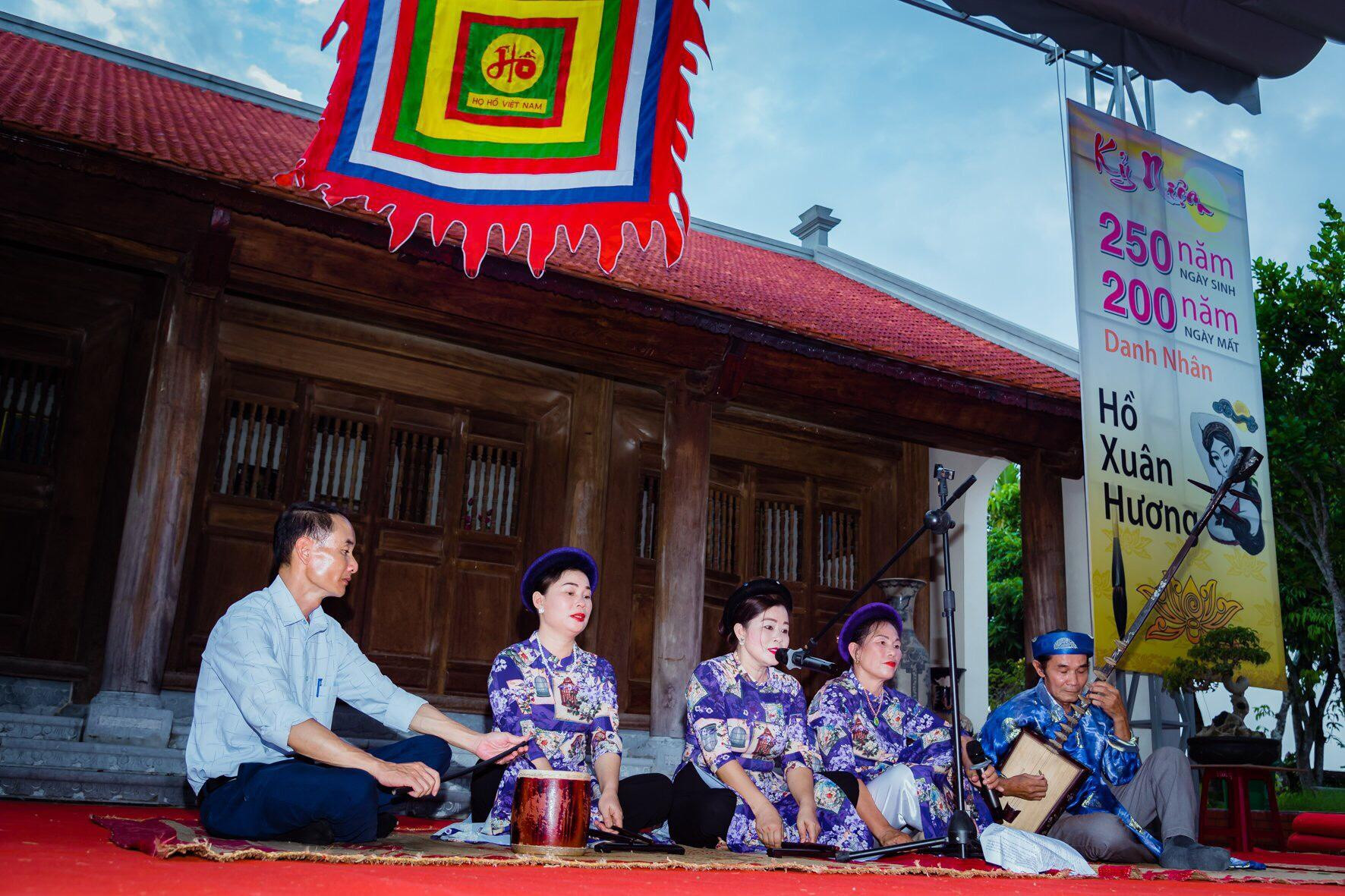 |
A performance at the poetry and music exchange of the Queen of Nom poetry Ho Xuan Huong in Quynh village. Photo: Nhat Thanh |
Continuing the tradition of their ancestors, today, the children of Quynh village still continuously study and strive to build and glorify their hometown. The valuable thing is that the village still maintains activities to educate the traditions of their hometown such as the Spring writing ceremony on the morning of the second day of Tet every year at the communal house of Quynh Doi commune with the participation of students. In addition, students in Quynh village often participate in many other activities such as visiting relics and taking competitions to learn about relics, famous people, and families in Quynh village... so that they can better understand their ancestors and the traditions of their hometown.
Another impression of Quynh land is… the cemetery. The cemetery area is very large, this is the gathering place of many generations of Quynh villagers, either after many ups and downs of wandering, or after a life of hardship, or after glory and wealth, all return to their ancestors. Each family has its own area, small and simple graves, whether they are high-ranking officials or commoners, rich or poor, all are equal. The graves are arranged according to the hierarchy of the family, no one, because of economic conditions or social status, separates to build something majestic and imposing.
I still remember, in the moment of farewell to Quynh village, poet and mathematician Le Quoc Han was moved when standing next to the stone stele of the Ho family temple, he fondled each name as if pondering something far away. He said, society flourished and declined, dynasties rose and fell, but Quynh Doi village in general, and the Ho family in particular, always produced talented people, great men who made their homeland and country famous!

.jpg)
